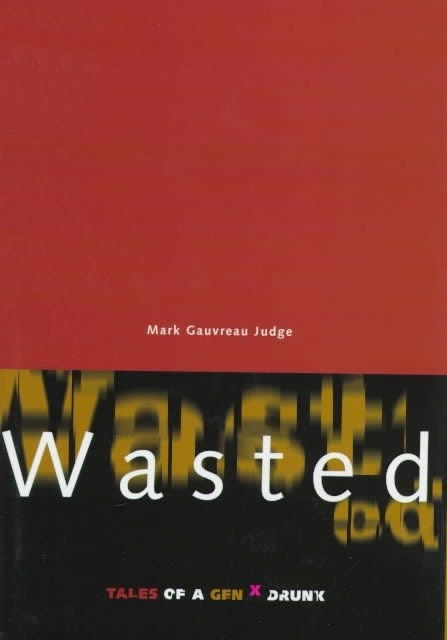Kavanaugh’s tell-tale adjectives
I like beer. No, I love beer, I’ve always loved beer, and I love beer to this day. Boys love beer. Girls love beer. Do you like beer? I love beer! Man, the brewskis! And I do occasionally drink too much beer. Lots of beer! But of course I’ve never drunk so much that I don’t remember what I did — Whaaaaaa???? Srsly?? He hasn’t? And how many times does a person for whom beer is just another beverage need to repeat the word “beer?”

When your best friend growing up published a memoir titled Wasted: Tales of a GenX Drunk — featuring a heavy drinker named Bart O’Kavanaugh who both puked and passed out — and is in your estimation so fragile that he shouldn’t be called to testify, it’s pretty hard to state categorically that you have never done things you can’t remember afterward because you were wasted. Separately, one might also infer that you failed in your job as a good friend to Mr. Judge by fueling his unhealthy relationship with drink, if not other substances. Wasted, indeed.
My most charitable explanation for last Thursday’s Congressional drama is that both Christine Blasey Ford and Brett Kavanaugh thought they were telling the truth: she did, because sexual assaults sear themselves in victim’s memories in ways they then struggle to erase for a lifetime; he thought he was telling the truth, because he had no memory of the incident. But I do believe it happened. By him. I believe her. Specifically, I believe her identifying him as her assailant, with full confidence.
Adjectives that matter
After the morning of Blasey Ford’s difficult, authentic, painful, polite, honest, vulnerable, riveting, credible, deferential and helpful testimony, I was wondering just how Kavanaugh was going to walk that fine line between not attacking her and being assertive and mad. We could easily expect that Kavanaugh would be angry, sad, alarmed and somewhat emotional. That is all natural. I wasn’t prepared for the approach he chose. He ignored that line completely.
What should remove Kavanaugh from any important judicial bench now is that he was at turns petulant, aggressive, evasive, belligerent, threatening, vengeful, sarcastic, blubbery, dismissive, self-pitying, arrogant, partisan, disdainful, nasty, mendacious, indignant, contemptuous, intemperate, gaslighting, maudlin, whiny, weepy, testy, disrespectful, insolent, insubordinate, defiant, paranoid (conspiracy!), dissembling, disingenuous, impulsive, careless, insensitive, uncooperative, overly emotional and generally out of control, as when he threw Senator Klobuchar’s question back at her.
His statement was also riveting.
By “threatening” and “vengeful,” I mean that Kavanaugh stated as fact that he was the victim of a left-wing conspiracy going back to the Clintons, and then said Democrats should remember this moment, because “what goes around comes around.” (Ironic words, given the parts of Kavanaugh’s likely past that are now making their way to the surface he’s kept so well polished.) So he said out loud that if he were on the Supreme Court, he would get even. Crazy!
Now go over that list of adjectives again, consider each word separately, and think of its implications. To make that easier, I’ll list them here, one per line:
- petulant,
- aggressive,
- evasive,
- belligerent,
- threatening,
- vengeful,
- sarcastic,
- blubbery,
- dismissive,
- self-pitying,
- arrogant,
- partisan,
- disdainful,
- nasty,
- mendacious,
- indignant,
- contemptuous,
- intemperate,
- gaslighting,
- maudlin,
- whiny,
- weepy,
- testy,
- disrespectful,
- insolent,
- insubordinate,
- defiant,
- paranoid (conspiracy!),
- dissembling,
- disingenuous,
- impulsive,
- careless,
- insensitive,
- uncooperative,
- overly emotional and
- generally out of control
Remember: Kavanaugh’s tactics were all optional. His victim used none of them. Kavanaugh chose to enter the subcommittee’s session and speak and behave that way. He said he wrote the speech himself, the day before. He knew this testimony was potentially a last stand for him, and he chose the Trumpian path out of his blind canyon. Any two or three of these adjectives ought to get him disqualified. As testimony of one or two adjectives, Vox showed a chart comparing the times each of the parties avoided answering questions:

Kavanaugh came in hot, much like Matt Damon’s parody of him on SNL, and he somehow stole the stage. Sadly, it (mostly) worked.
Don’t you hate it when Mr. Hyde shows up?
Thursday was an unusual and dramatic Jeckyll-and-Hyde moment on the American public stage. The “carpool dad” who had been so quiet and professional in the first hearings melted into a caricature of a spoiled public figure who wasn’t getting his way. Kavanaugh’s emotions and reactions were those of someone who is being unmasked as the person he’s been keeping in the back closet, in front of his family and many others who have been shown a very different persona, not the reactions of an innocent man who would like us all to help prove him right.
When your case is weak but the stakes are high, fulminate and bloviate, as Kavanaugh did, and as Senator Graham memorably did as well in the middle of this turmoil. Graham is living up to tradition: One of his predecessors, South Carolina Representative Preston Brooks, almost killed Representative Charles Sumner of Massachusetts by beating him with his cane on the floor of Congress — for giving too eloquent a speech against slavery. It took Sumner three years to return to Congress.
But Kavanaugh was class president! Captain of the football team! Went to Yale! Those folks never commit sexual assault, right? Kavanaugh wasted so much committee time invoking his credentials that I wish someone had disarmed him of that argument early on by citing some relevant stats.
That Kavanaugh, whingeing about ten very difficult days in his life as he nears the capstone of a career, couldn’t acknowledge that Blasey Ford’s life has been turned on its head dangerously, with no upside visible and enough threats on her life that she has moved twice already, after decades of quiet suffering (at his hands, most likely) and worse public treatment right now (just ask any woman how nice the Internet trolls are to her) speaks volumes. It is also evidence of why victims are so hesitant to come forward.
Kavanaugh’s over-the-top emotionality is proof of his guilt. Kavanaugh’s claims that his life is ruined are only true if the allegations that are now in full public view are true. His reputation has been besmirched, that’s for sure, but if he cooperated it might be cleaned up, and those who believe him will always stand by him, especially if he joins the Court (Justice Thomas is doing just fine). Kavanaugh’s wife was sitting stolidly behind him as he testified (though she likely knew she was watching a train wreck), and I’m sure they can see their girls through this traumatic time. Yet he is still likely on the rails to be a Supreme Court justice, a role that will wash away many sins — unless he is the swing vote to help Donald Trump pardon himself. Oh wait… how did we lose the plot on the inherent conflicts of interest in this nomination? Can everyone please wear Merrick Garland buttons for the next week?

A side note about mainstream media: In the days when I had and watched a TV, I was a big fan of the PBS News Hour segment featuring dueling political analysts, these days featuring Mark Shields and David Brooks. That neither Shields nor Brooks, whose writings would make him seem a thoughtful student of the human condition, could find their way to say that Kavanaugh’s testimony was even mildly less credible than Blasey Ford’s is mind boggling. They both called it a draw. It seems time to retire Mr. Shields, who seems more and more like an Alan Colmes character than a faithful representative of the Left. Perhaps a woman of color should fill that role?
(For mind-mapping geeks: I’ve mapped the interesting articles and videos around Thursday’s testimony here: https://bra.in/7pWMoj .)
The trust perspective
I see the world a lot these days through the lens of trust, which makes this era extra fascinating — and frightening.
The basic trust question from last Thursday’s hearing is pretty straightforward: whose testimony should we trust, Dr. Blasey Ford’s or Judge Kavanaugh’s? From what I wrote above, I hope it’s clear why only Blasey Ford’s testimony is trustworthy.
But the backdrop to Thursday’s drama is a much larger trust battle being played out on the global stage. Some players in the global political arena have discovered that trust can be undermined and weaponized. This tactic is ancient, but neither Sun Tzu nor the Stasi ever had all the data Cambridge Analytica got, nor could they reach every citizen at a moment’s notice. Breaking trust makes people fearful and easy to manipulate. It’s not a morally defensible strategy, but boy does it work, especially in a world that hasn’t yet worked its way free from patriarchal rules and norms.
Keeping the patriarchy’s walls intact requires denying the reality of #MeToo, as well as #BlackLivesMatter and #NeverAgain. If marginalized people suddenly get power, the patriarchy is in trouble, and it knows it. It will defend itself with everything it has, fueled by its fears of loss.
Which brings me to the crazy twist: trust is our way out of this mess. Only when defenders of the patriarchy can trust that their futures may in fact be better with those walls down, will they let them be brought down. The long course of human history shows how resilient those walls have been, even across many generations.
For the short term, and the closer battle, I hope enough evidence of Kavanaugh’s mendacity shows up in the next week that two or three more conservatives in Congress can’t see their way clear to confirming him to the Supreme Court. If the mendacity doesn’t do it, they can choose from the 35 other adjectives listed above.
